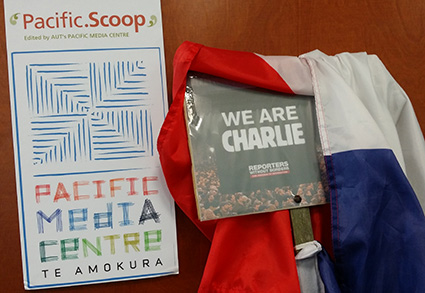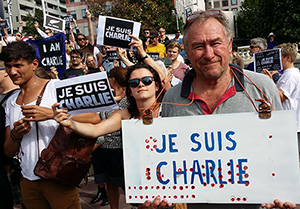
SYDNEY (International Federation of Journalists/Pacific Media Watch): Media unions and press freedom groups from across the Asia-Pacific have joined the International Federation of Journalists (IFJ) in a regional show of solidarity and joint condemnation of the brutal attack that took the lives of 10 media workers in France this week.
The drama ended in Paris on Friday when two brothers suspected of a bloody attack on the offices of French satirical magazine Charlie Hebdo were shot dead when anti-terrorist police stormed their hideout, while a second siege ended with the deaths of four hostages.
Around the world, global media networks have reacted strongly to the massacre of 12 people at Charlie Hebdo, with vigils and public rallies happening across the region.
In their messages of support, Asia-Pacific journalists and their trade union condemned the outrageous attack and gave support to their French colleagues.
Their messages reinforce the need for media to stand together against the threats and killings that seek to intimidate journalists and destroy freedom of expression and democracy around the world.
The IFJ Asia-Pacific acting director Jane Worthington said: “We stand together with heavy hearts to offer our condolences to our brave French colleagues and their families who are suffering so terribly right now. This intolerable attack is a violent reminder of the challenges that journalists across the globe face every day in doing their jobs.”
On January 7, at 11.30am, two armed men stormed the offices of French magazine, Charlie Hebdo and killed 10 staff (including a guest editor), 2 police officers and wounded 11 others. The gunmen then fled the scene. A third suspect later handed himself into police.
Magazine firebombed
Charlie Hebdo is a French satirical weekly, renowned for its controversial cartoons and commentary on current affairs. The magazine was most recently attacked in 2011, with its office firebombed following the publication of the magazine, edited by the Prophet Muhammad.
Charlie Hebdo editor Stephane Charbonnier, who was among those killed in the attack, was under police protection following a number of threats against his life. In 2011 Charbonnier said in response to the threats: “I would rather die standing than live on my knees.”
The attack in France has come as a stark reminder of the challenges that journalists face across the world.
On the same day that 10 media workers were killed in France, an Asia-Pacific journalist was also murdered.
Nerlita Ledesma, a 48-year-old journalist from Bataan in the central Philippines, was shot multiple times as she waited for a ride to work.
“The Asia-Pacific is the deadliest region in the world for journalists and our colleagues here are acutely aware of that reality. But what is clear is that we will not be silenced through fear. We continue to fight for the right to freedom of expression. Journalists will continue to defend that right every day. Today and every day forward we are all Charlie Hebdo,” Jane Worthington said.
The latest IFJ reports show 2015 is continuing on from a dire year for journalist killings.
In 2014, 118 journalists across the world were murdered. An increase of 13 from the previous year, and the Asia Pacific region topped the global list with 35 murders.
Pakistan is the most dangerous country globally, with 14 journalist killed in 2014.
 Fiji protest
Fiji protest
In Suva, the Fijian Media Association condemned the "horrific killing of journalists and colleagues" in Paris.
"This is an attack on free speech and freedom everywhere, and it must be made very clear that violent attacks on journalists will not succeed, whatever the short term feeling of victory the perpetrators may feel," said president Ricardo Morris.
"We rise with our colleagues around the world to ensure that freedom will prevail. This is a reminder to the world that if we lose talented, provocative and great journalists and cartoonists like our colleagues from Charlie Hebdo, the world will be a darker, poorer, miserable and distressingly empty place to live in."
In Auckland, a big crowd of French expatriate and New Zealand cartoonists, photographers, film makers and citizens gathered for a vigil to pay tribute to "We are Charlie".
This work is licensed under a Creative Commons Attribution-NonCommercial 3.0 New Zealand Licence.




